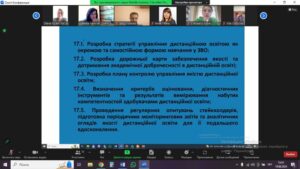June 19, 2024
Joint meeting of the executive committee and the quality and ethics committee within the ERASMUS+KA2 DEFEP project

Joint meeting of the executive committee and the quality and ethics committee within the ERASMUS+KA2 DEFEP project
On June 19, 2024, a joint meeting of the Executive Committee and the Quality and Ethics Committee was held within the framework of the ERASMUS+KA2 DEFEP project “Distance education for the future: EU best practices in response to the requests of higher education and the labor market” (No. 101083143 — DEFEP — ERASMUS- EDU-2022-CBHE). During the meeting, the members of the consortium discussed the preparation of the interim report on the DEFEP project and the financial aspects of the implementation of project activities.
Institutional coordinator of the DEFEP project from Chernihiv Polytechnic National University, Doctor of Economics, prof. Nataliya Ivanova, as the head of the Quality and Ethics Committee, familiarized the meeting participants with the specifics of tasks within the work package WP 7 “Monitoring and quality assurance of the distance education system” (description, expected results, set deadlines and requirements).
- Methodical materials developed to ensure the quality of the educational process and observe academic integrity among students and teachers were presented;
- online course for students of higher education “Academic Integrity and Fundamentals of Information Literacy”;
- informational materials – academic integrity posters.
Particular attention was paid to the distribution of responsibilities for the development of documents regulating criteria, tools for diagnosis and evaluation of learning outcomes (result D7.2 – System for monitoring and evaluating learning outcomes).
The project is co-financed by the European Union, but the views and opinions expressed are those of the authors of this project alone and do not necessarily reflect the views of the European Union or the European Education and Culture Executive Agency. Neither the European Union nor the grantor can be held responsible for them.




